
Through the ongoing ethnic cleansing and genocide being committed by the government of myanmar (burma) against the Rohingya there have been two questions in my mind. Why is Nobel Peace Prize recipient aung san suu kyi tolerating this and why hasn't the Dalai Lama done more to stop the actions of the buddhist government and population of myanmar? Turns out aung san suu kyi deceived the world, she is not for peace and the protection of human rights. And it turns out the Dalai Lama has been speaking out against the violence against the Rohingya for months, calling on the buddhist government and aung san suu kyi to end the violence and to honor the human rights of the Rohingya in myanmar. After reading this e mail from SumOfUs, The Guardian and VOA News, one more question arises. ISRAEL, why are Israeli companies permitted to supply arms and training to the myanmar military and actually have trainers / advisors on the ground in rakhine state in myanmar advising on / participating in (?) the ethnic cleansing and genocide against the Rohingya? Has your occupation of the West Bank numbed you enough that you do not think about the Holocaust?
| |||||||
SumOfUs is a worldwide movement of people like you, working together to hold corporations accountable for their actions and forge a new, sustainable path for our global economy.
Myanmar: new footage reveals scorched-earth campaign against Rohingya
Government accused of systematic strategy in Rakhine state as Rohingya claim soldiers torched their homes and fired on them after urging them to leave
Satellite imagery has shown flames engulfing huge swaths of Myanmar’s Rakhine state, prompting accusations that state forces are adopting a deliberate and systematic scorched-earth campaign to drive out the Rohingya Muslim minority.
In addition to the satellite evidence, captured by Amnesty International, the Guardian has received video footage from Rohingya villagers fleeing their homes as they attempt to make their way to Bangladesh. The clips show fires burning in the distance and hundreds of people hiking up muddy jungle paths and crossing rivers with sacks and baskets crammed with their belongings. The Guardian has been shown at least two images of corpses.
The footage has not been independently verified by the Guardian as media access to the area is strictly controlled.
Amnesty’s satellite imagery accompanies new testimony from Rohingya refugees, who claim they were warned of attack by state forces and told to flee their villages, only to be fired upon and stabbed at random by soldiers as they tried to run away.
At least 370,000 Rohingya have fled across the border to Bangladesh over the past three weeks. Unicef, the UN children’s agency, has estimated that more than 1,100 children have arrived in Bangladesh unaccompanied, and warned the number will increase in the days ahead.
“The military attacked at 11am. They started shooting at houses and at people, it went on for around an hour,” said a Rohingya man from Myo Thu Gyi in Maungdaw township, near the Bangladesh border. “When people fled, they burned the houses with bottles of petrol and rocket launchers. The burning continued for three days. Now there are no homes in our area – all are burned completely.”
Amnesty has corroborated the testimonies by matching them with fire-detection data, satellite imagery, photographs and video from the ground, as well as interviews with eyewitnesses in Myanmar and Bangladesh.
Satellite sensors show that at least 80 major fires have torn across inhabited areas in northern Rakhine since 25 August, when the Myanmar army launched a military operation following attacks on police posts by the militant Arakan Rohingya Salvation Army (Arsa). Imagery from the same period over the past four years detected no fires of comparable magnitude anywhere in the state.
Cumulatively, the evidence indicates that Rohingya homes have been deliberately targeted in what foreign governments and human rights organisations have largely condemned as “ethnic cleansing”.
Tirana Hassan, Amnesty International’s crisis response director, described the evidence as irrefutable and said it was illustrative of crimes against humanity.
“There is a clear and systematic pattern of abuse here. Security forces surround a village, shoot people fleeing in panic and then torch houses to the ground. In legal terms, these are crimes against humanity – systematic attacks and forcible deportation of civilians.”
On a recent trip to Maungdaw, the BBC – which had been invited to the area by the Myanmar government – witnessed a Muslim village burn to the ground just after it had been set alight by Rakhine Buddhist youths, who told the BBC they had done so with the help of the police.
Myanmar’s presidential spokesman Zaw Htay admitted on Wednesday that nearly 500 villages had been targeted by the Burmese army in “clearance operations” in response to the Arsa attack on 25 August. Nearly 40% of the villages were now completely empty, Zaw added, and an additional 10% partially abandoned.
Myanmar’s de-facto leader, Aung San Suu Kyi, who has come under international criticism for her failure to condemn the attacks, was due to attend the UN general assembly next week. But Zaw Htay said she would remain in the country as the government is facing “riots in some areas” and, allegedly, impending “terrorist attacks”, supposedly from Rohingya militants.
Reports have also emerged of Bangladeshi boat operators targeting Rohingya and demanding they pay up to $100 (£75) to cross into Bangladesh, a trip that usually costs 50 cents by ferry.
“The boatman extracted every last penny from us for the ferry. Now we want to go to the camp but don’t have any money,” Momena Begum, 35, a Rohingya mother of five, told AFP.
Another Rohingya woman, Nadera Banu, 19, said she was forced to trade the one item that meant everything to her in order to survive.
“The boatmen threatened to throw us into the sea if we refused to give them our valuables,” said Banu, who got married only last year but is already a widow.
“I gave up the final memento of my husband, a gold locket given on my wedding day, to escape.”
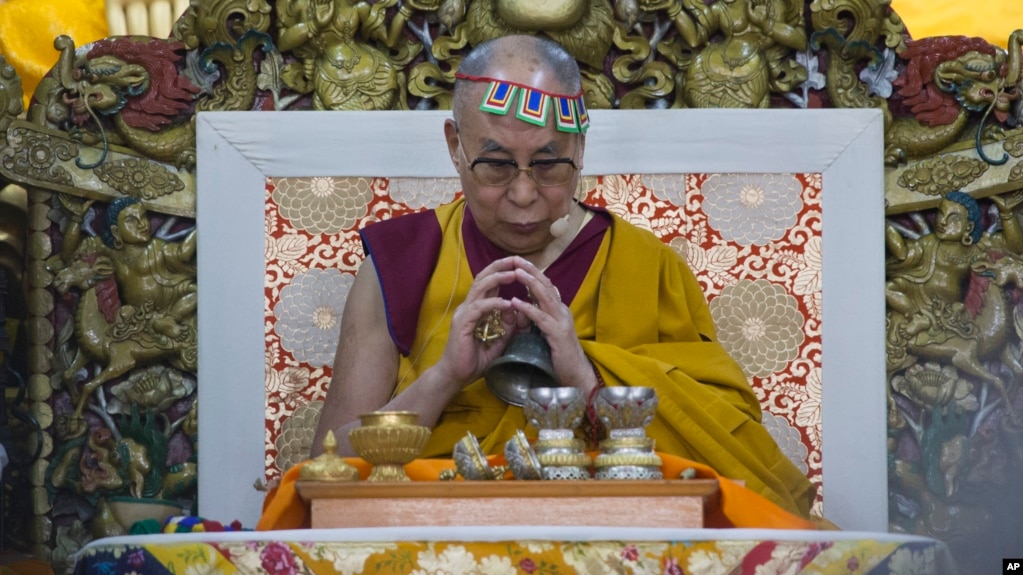
The Dalai Lama, the exiled Tibetan spiritual leader, has again called on his fellow Nobel Peace Prize recipient Aung San Suu Kyi to peacefully end the Rohingya crisis.
"May I take the liberty of writing to you once again to tell you how dismayed I am by the distressing circumstances in which the situation seems to have deteriorated further," he wrote to Myanmar's de facto leader.
VOA's Tibetan Service received a copy of the letter, in which he refers to discussions the two had a few years ago, when he urged her to use her "influence to bring about a peaceful" resolution to the problems of the Muslim community. In June 2016, he urged her to "make efforts to reduce" the tension.
"It is disappointing to observe that the problem appears to be getting worse and the violence is increasing," he wrote. The letter apparently was sent two weeks ago.
The Dalai Lama also warned Aung San Suu Kyi and other Myanmar leaders that not resolving the crisis peacefully could lead to "further unrest and destruction."
"I appeal to you and your fellow leaders to reach out to all sections of society to try to restore friendly relations throughout the population in a spirit of peace and reconciliation," he said.
The Tibetan Buddhist leader said this is not only a correct and "realistic way" for the nation to move forward, but also a way to "earn the world's goodwill and respect."
"As a fellow Buddhist and Nobel Laureate, I am appealing to you and your colleagues once more to find a lasting and humane solution to this festering problem," he said.
On Friday, the Dalai Lama told reporters he had no doubt that Buddha would have helped the Rohingya people.
The Rohingya are a Muslim minority group in Myanmar, which is largely Buddhist. Most live in northern Rakhine state. The Myanmar government considers them illegal immigrants, although most families have been in the country for generations.
Late last month, a group called the Arakan Rohingya Salvation Army attacked police posts in Rakhine, sparking a violent crackdown against Rohingya villages. More than 300,000 people have fled to Bangladesh, reporting deliberate attacks against civilians, including children.
Zeid Ra'ad al-Hussein, the United Nations high commissioner for human rights, on Monday condemned the security operation in Rakhine state, saying it "seems a textbook example of ethnic cleansing."
Other Nobel laureates have called on Aung San Suu Kyi to take action, including South Africa's Bishop Desmond Tutu, Iranian rights activist Shirin Ebadi and the youngest recipient, Malala Yousafzai.
Some regional experts have noted that Aung San Suu Kyi leads a fragile new democracy and faces pressure from the country's military, which dominates Myanmar.


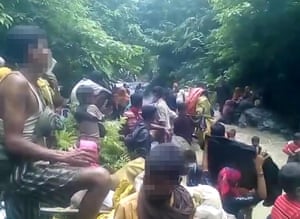
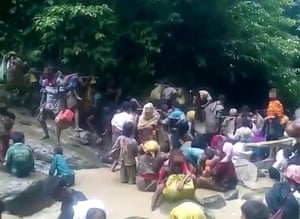
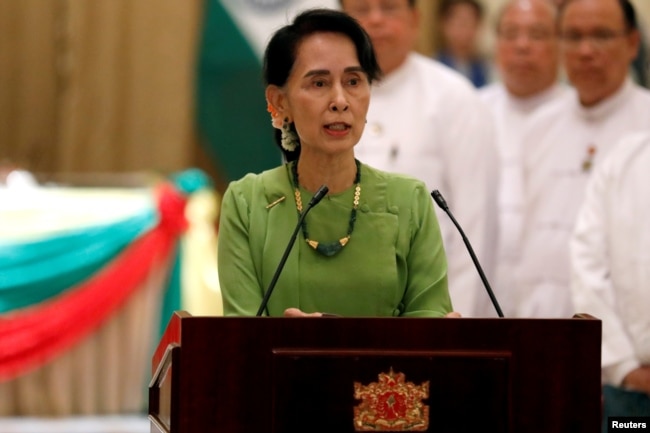
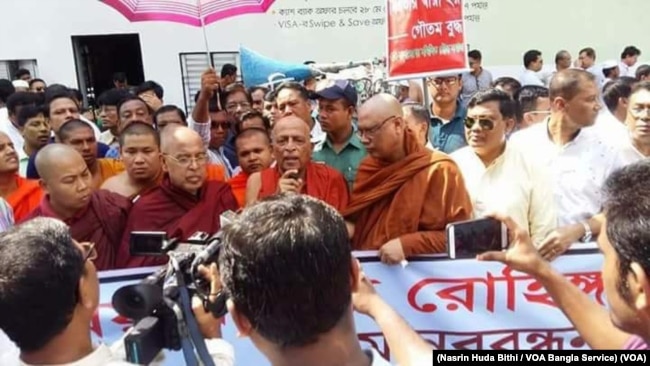
No comments:
Post a Comment